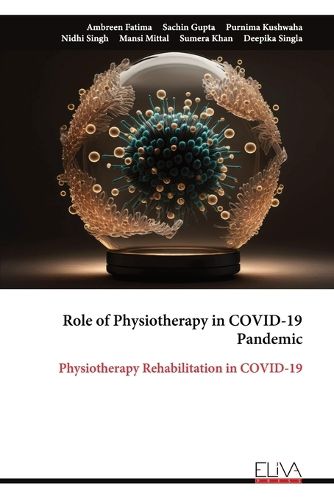Readings Newsletter
Become a Readings Member to make your shopping experience even easier.
Sign in or sign up for free!
You’re not far away from qualifying for FREE standard shipping within Australia
You’ve qualified for FREE standard shipping within Australia
The cart is loading…






This title is printed to order. This book may have been self-published. If so, we cannot guarantee the quality of the content. In the main most books will have gone through the editing process however some may not. We therefore suggest that you be aware of this before ordering this book. If in doubt check either the author or publisher’s details as we are unable to accept any returns unless they are faulty. Please contact us if you have any questions.
The COVID-19 pandemic has reshaped aspects of Physiotherapy (PT) globally, impacting both personal and professional spheres of physiotherapists (PTs). This book aims to examine the pandemic's effects on PT and underscore the importance of physiotherapy. Healthcare providers, including PTs, faced significant challenges across physical, psychological, social, and financial domains. PTs play a vital role in the physical recovery of COVID-19 patients, necessitating a multidisciplinary rehabilitation approach. Tele-physiotherapy emerges as a new avenue for PTs to deliver healthcare services remotely. Exercises not only enhance immune response and mental health but also mitigate viral infection consequences. Consequently, PTs contribute to COVID-19 patient care and bolster the healthcare system.Cardiac rehabilitation has evolved over three centuries, and now to a multi-faceted, multi-morbidity chronic disease management programme. The key clinical outcomes have shifted from achieving unnecessary prolonged bed-rest and sooner return to figure, to reduced mortality and more recently to healthcare cost savings.. With both medical and private care technology advancing and aiding within the preservation of life, it's important to always be mindful of what this suggests in reference to the each patient's quality of psycho-social life. An emerging focus for CR, and in some cases "pre-habilitation", is that of a chronic disability management programme increasingly delivered in community and residential set- tings. Within this delivery model, the utilization of remote personalised technologies is now emerging, especially with new needs accelerated by the pandemic of COVID-19.
$9.00 standard shipping within Australia
FREE standard shipping within Australia for orders over $100.00
Express & International shipping calculated at checkout
Stock availability can be subject to change without notice. We recommend calling the shop or contacting our online team to check availability of low stock items. Please see our Shopping Online page for more details.
This title is printed to order. This book may have been self-published. If so, we cannot guarantee the quality of the content. In the main most books will have gone through the editing process however some may not. We therefore suggest that you be aware of this before ordering this book. If in doubt check either the author or publisher’s details as we are unable to accept any returns unless they are faulty. Please contact us if you have any questions.
The COVID-19 pandemic has reshaped aspects of Physiotherapy (PT) globally, impacting both personal and professional spheres of physiotherapists (PTs). This book aims to examine the pandemic's effects on PT and underscore the importance of physiotherapy. Healthcare providers, including PTs, faced significant challenges across physical, psychological, social, and financial domains. PTs play a vital role in the physical recovery of COVID-19 patients, necessitating a multidisciplinary rehabilitation approach. Tele-physiotherapy emerges as a new avenue for PTs to deliver healthcare services remotely. Exercises not only enhance immune response and mental health but also mitigate viral infection consequences. Consequently, PTs contribute to COVID-19 patient care and bolster the healthcare system.Cardiac rehabilitation has evolved over three centuries, and now to a multi-faceted, multi-morbidity chronic disease management programme. The key clinical outcomes have shifted from achieving unnecessary prolonged bed-rest and sooner return to figure, to reduced mortality and more recently to healthcare cost savings.. With both medical and private care technology advancing and aiding within the preservation of life, it's important to always be mindful of what this suggests in reference to the each patient's quality of psycho-social life. An emerging focus for CR, and in some cases "pre-habilitation", is that of a chronic disability management programme increasingly delivered in community and residential set- tings. Within this delivery model, the utilization of remote personalised technologies is now emerging, especially with new needs accelerated by the pandemic of COVID-19.